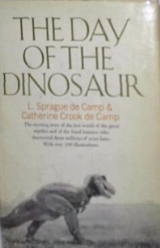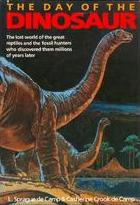
The Day of the Dinosaur
Encyclopedia
- For the Hardy Boys novel, see Day of the DinosaurDay of the DinosaurDay of the Dinosaur is the 128th book in The Hardy Boys series, written by Franklin W. Dixon.-Plot summary:When the Hardy Boys sign on to help prepare for opening day of the new Bayport museum's dinosaur park, the teenage sleuths discover that a deadly, high-tech saboteur is out to put the museum...
.
The Day of the Dinosaur is a science book
Science book
A science book is a work of nonfiction, usually written by a scientist, researcher, or professor like Stephen Hawking , or sometimes by a non-scientist such as Bill Bryson...
by L. Sprague de Camp
L. Sprague de Camp
Lyon Sprague de Camp was an American author of science fiction and fantasy books, non-fiction and biography. In a writing career spanning 60 years, he wrote over 100 books, including novels and notable works of non-fiction, including biographies of other important fantasy authors...
and Catherine Crook de Camp
Catherine Crook de Camp
Catherine Crook de Camp, was an American science fiction and fantasy author and editor. Most of whose work was done in collaboration with her husband L. Sprague de Camp, to whom she was married for sixty years. Her solo work was largely non-fiction.-Life:Catherine Crook was born Catherine Adelaide...
, illustrated with plates. It was first published in hardcover by Doubleday in 1968, and in paperback by Curtis Books in 1971.
As stated on the cover of the Doubleday edition, the work is a survey of "the exciting story of the lost world of the great reptiles and of the fossil hunters who discovered them millions of years later." It argues, among other things, that the theory
Theory
The English word theory was derived from a technical term in Ancient Greek philosophy. The word theoria, , meant "a looking at, viewing, beholding", and referring to contemplation or speculation, as opposed to action...
of evolution
Evolution
Evolution is any change across successive generations in the heritable characteristics of biological populations. Evolutionary processes give rise to diversity at every level of biological organisation, including species, individual organisms and molecules such as DNA and proteins.Life on Earth...
took hold after Darwin
Charles Darwin
Charles Robert Darwin FRS was an English naturalist. He established that all species of life have descended over time from common ancestry, and proposed the scientific theory that this branching pattern of evolution resulted from a process that he called natural selection.He published his theory...
because of interest spurred by recently popularized dinosaur
Dinosaur
Dinosaurs are a diverse group of animals of the clade and superorder Dinosauria. They were the dominant terrestrial vertebrates for over 160 million years, from the late Triassic period until the end of the Cretaceous , when the Cretaceous–Paleogene extinction event led to the extinction of...
remains, corresponding to legend
Legend
A legend is a narrative of human actions that are perceived both by teller and listeners to take place within human history and to possess certain qualities that give the tale verisimilitude...
s of dragons.


